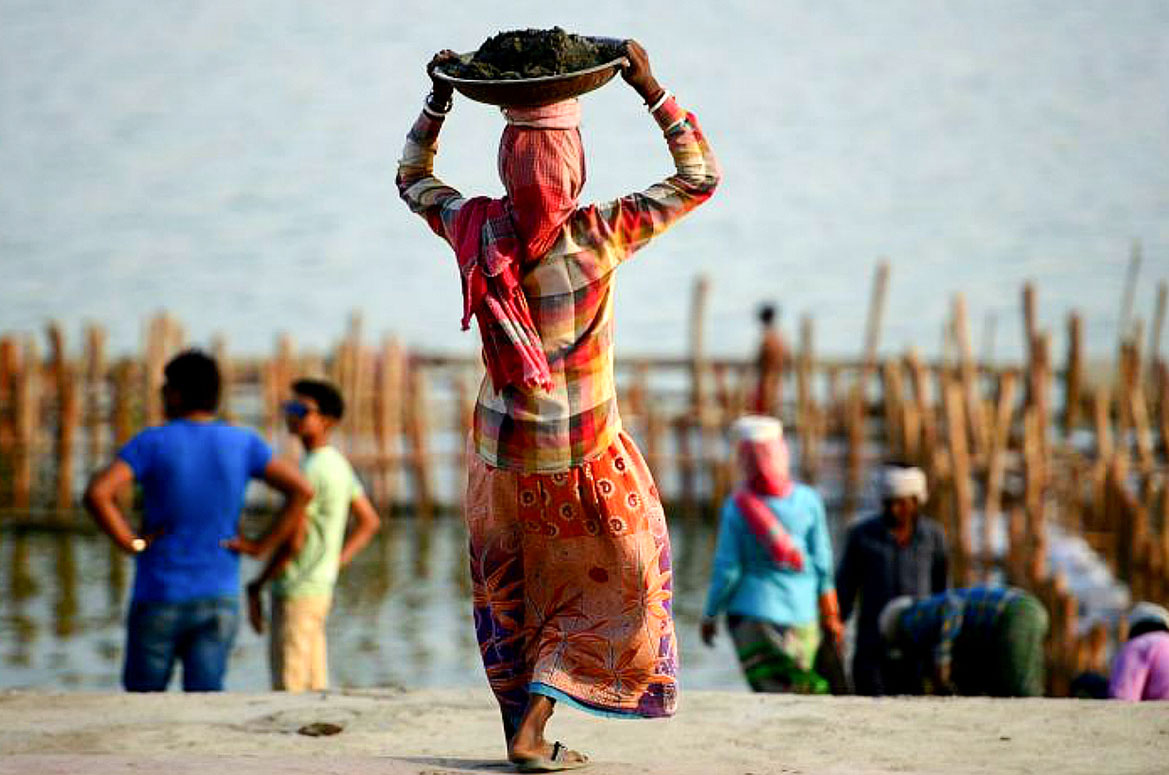India’s Workplace Harassment Law Has Failed Informal, Marginalised Workers

India’s law on sexual harassment at work has failed to account for the experiences of informal sector working women, most of who are from marginalised communities – Dalits, Adivasis and Bahujans.
This denial of workplace justice to women who are doubly marginalised can be traced to two factors: the failure of the Sexual Harassment of Women at Workplace (Prevention, Prohibition and Redressal) or the POSH Act to take into account the the reality of marginalised women and the flawed functioning of the redressal mechanism set in place under the Act.
It is in this background of failure of the legal system in recognising the doubled nature of violence against women from marginalsied communities that #DalitWomenFight, an anti-caste feminist collective, stated this during the #MeToo movement:
“We have been wondering about ‘me’ in #MeTooIndia and have not been able to locate ourselves in this current framework…..We remain unnamed and our struggles unnoticed…we cannot even begin to imagine a gender-just world in a society that is ridden by caste divisions.”
There is a long history to the Indian judiciary’s approach to sexual violence against marginalized women at workplace and beyond. Scholars have found in their research that courts are more likely to believe Hindu women, virgin daughters, and loyal wives than Dalit women who are seen as following different notions of ‘honour’. Courts neither see them observing the same rules of shame and honour, nor as having the same credential of a ‘respectable woman’ for their testimonies to be trusted.
Failure of Feminist Discourse and Court
The history of the POSH Act itself can be traced to an act of sexual violence against a Dalit woman in a state with a strong history of caste and gender-based violence. Bhanwari Devi, a sathin (volunteer worker) with the Rajasthan government had campaigned against and worked to stop female infanticide, dowry, and child marriages. Angered by this, the upper caste Gurjars decided to boycott her and her family. Her husband was attacked, children threatened and, in September 1992, she was gangraped by five upper caste men.
The police did not believe Bhanwari’s complaint and abdicated its duty of proper investigation and ultimately, the upper caste accused were acquitted on the ground that “an upper caste man will not defile himself by raping a lower caste woman”. The court further held that an elderly man, who is a village head, will not rape a woman of her caste in front of other relatives.
The appeal against this order of the trial court is still pending in the Rajasthan High Court, 30 years later. But what the crime did was to trigger a significant chain of events.
It led to the filing of a public interest litigation by a feminist organisation Vishaka in the Supreme Court demanding the prevention of sexual harassment of women at workplace. The petitioner prayed that incidents like Bhawanri’s rape are in violation of Articles 14,19 and 21 of the Indian Constitution. The court accepted this argument and recognised that dignity, equality, and the right to trade profession require the availability of a “safe” working environment.
The court then issued detailed guidelines on the prevention of sexual harassment of women at the workplace and prescribed a mandatory duty of employers to ensure safe working environment. These guidelines ultimately became the basis of the POSH Act in 2013.
This judgement of the Supreme Court is often hailed as a victory for rights of women both in India and at the international level. But Vishakha mainly addresses conditions of upper caste middle-class women, leaving the double subordination of marginalised women untouched. The violence against Bhanwari only appears in the initial paragraphs of the case and is then forgotten.
While the court recognised sexual harassment as “discrimination” and “violation of rights of women”, the guidelines ultimately framed do not recognise that sexual violence against women could be motivated by caste, and other kinds of marginalisation. The peculiar and double violence against Dalit working women becomes sub-merged into category of “all women”.
This is a failure of both the mainstream feminist discourse and the Supreme Court. Not only did the case miss the immediate context of the case, but it also set the tone for the continuous devaluation of marginalized women’s experience under the POSH Act.
The Indian workforce is largely based in the informal sector. Women constitute more than half (56.7%) of the non agriculture informal sector according to the latest data from the Periodic Labour Force Survey Annual report, 2020-2021. Most of them come from marginalised communities, extremely resource-poor backgrounds and are sole bread-winners for their families. They are often illiterate and unaware of the law, making it extremely difficult for them to speak against harassment. They also fear loss of livelihood and the stigma associated with the issue, which further deters them from reporting such violence.
POSH Has Wider Definitions Of Employer, Employee, Workplace
The POSH Act has an expansive interpretation of seuxal harassment at work.
Unlike the Vishaka guidelines, the POSH Act specifically recognises the sexual harassment of women in the unorganised sector. Through its wider definition of employee and employer, and the mechanism of local committees, a framework has been provided for addressing sexual harassment of women in the unorganised sector.
Another difference between the POSH Act and the Vishaka guidelines is the wider definition of both the employee and employer. A working woman, irrespective of the nature of employment (temporary, permanent or contractual), number of employees in her workplace (formal or informal), or payment (volunteer or paid work), is equally entitled to the right to dignity, and a safe working place.
Under section 2(f), “employee” includes:
- A woman worker employed on a regular basis.
- Temporary worker
- Ad hoc worker
- A woman worker employed on daily-wage basis
- A woman worker Employed either directly or indirectly (through a contractor)
- Contractual worker employed with or without knowledge of principal employer
- Volunteered or salaried worker
- Whether the terms of employment expressed or implied
- Probationer
- Trainee
- Apprentice
- Or any such other worker
The definition of the employer under section 2(g) not only includes formal institutions but also local authorities and employers in the context of employment in households or dwellings (domestic workers). Similarly, the definition of the workplace is also wider.
Following are examples of women workers in the informal sector recognised by the act:
- A woman employed in a mohalla kirana store where there are less than 10 sales persons.
- A woman working in a not-for-profit organisation.
- Self-employed women, for instance, a woman street vendor.
- A beedi worker who visits the factory to deliver the finished produce and is harassed by her contractor.
- A woman working on a construction site asked to go to different locations of construction.
- An ASHA worker: notably the government itself is a large-scale employer of “volunteer” workers
Recognising domestic workers
Domestic work is informal work, largely employing women workers who often lack any documentary proof of their employment and are thus deprived of social security protections. This increases their vulnerability to sexual harassment. The POSH Act thus specifically provides for redressal of violence faced by domestic workers.
Under section 2(a), in the definition of aggrieved women, a woman employed in dwelling or a house is specifically recognised. Similarly, in section 2(e) domestic workers are defined: a domestic worker is a worker who is employed to do the household work in any household for remuneration irrespective of whether she is receiving payment in cash or kind, whether she is employed directly or through any agency and irrespective of nature of employment (temporary, permanent, part time or full-time basis). Thus, domestic workers living within their employer’s residence or visiting for a few hours a day are both covered under the Act.
Local Committees Are Critical For POSH Implementation
The act provides for two kinds of committees for the prevention and redressal of sexual harassment at workplace: one, an Internal Committee for the organised sector and second, a local committee, for the unorganised sector. The unorganised sector has been defined as enterprises which have less than 10 workers.
Under section 6, a District Officer is required to constitute a committee, called the Local Committee, to receive complaints of sexual harassment from unorganised enterprises. The District Officer is also required to designate a nodal officer in every block, taluka and tehsil or ward, to receive these complaints which must be forwarded within 7 days of receipt.
The committee includes a chairperson, usually an eminent woman in the field of social work and committed to the cause of women; one member from amongst the women working in block, taluka or tehsil or ward or municipality in the district; two members from NGOs or associations working on issues of sexual harassment and an ex-officio member who is the Social Welfare or Women and Child Development officer of the district.
Further, at least one of the nominees shall be a woman from Scheduled Castes or the Scheduled Tribes or the Other Backward Classes or minority community.
Non-constitution of Local Committees
District Authorities play a vital role in ensuring that women from unorganised sectors have a redressal mechanism against sexual harassment. The District Officer not only nominates the committee and notifies the nodal officers at the local level, she/he is also required to take action if the allegations are proven on the recommendation of the Local Committee. Further, the inquiry report on the allegations of sexual harassment is also submitted to the District Officer.
However, District Officers have been found lacking in their duties. A study of 655 districts by the Martha Farrell Foundation, through RTI in October 2018 found that local committees are largely “defunct”, marred by the “improper constitution of membership” and “lack of awareness of roles and responsibilities amongst members”.
Of 655 districts, only 29% said they have formed local committees and 15% said they did not. 57% of the districts said they did not know if they had the local committees.Of the 29% who responded, only 16% had a woman chairperson, a mandatory requirement in the composition of the Committee under section 7. Further, only 18% said they have five or more members in the committee. As many as 103 districts had yet to establish a committee.
Appellate authorities had also not been appointed.
Under the Act, failure to constitute an Internal Committee by the employer attracts a penalty. But there is no clear-cut mechanism for ensuring actual accountability of the District Officer.
There is also a lack of effective data on the working of local committees which, unlike Internal Committees, have remained under-studied. This is true of local committees both in civil society and government bodies (like the NCW). Even in the Martha Farrell Foundation Study, 56% districts did not respond to RTI queries. This again shows lack of interest in reviewing the working of the local committees in government bodies. This reduces the capacity of informal sector women workers in demanding better implementation of the law.
Underreporting, Lack of Proactive Approach by Local Committees
Despite the elaborate process of complaint and inquiry, the actual cases reaching local committees are almost nil. The Martha Farrell Foundation Study finds that of all districts with local committees, only 11% responded to complaints received under the act. Similarly, in Mumbai, by 2020, the Local Committee had only received five complaints and all from the formal sector. Another study of domestic workers in certain areas of Delhi by the same foundation found that none of the domestic workers complained to the Local Committes though they dealt with multiple instances of sexual harassment.
There are several reasons for this defunct nature of local committees. In Martha Farrell Foundation’s rapid survey on domestic workers in Delhi, it was found that many domestic workers had not even heard of these panels. And no information was found on them on the internet.
This shows an absence of proactive approach on the part of local committees. Under the law, they are not merely intended to be redressal committees, but also as bodies that take actions for the prevention of sexual harassment. It was to clarify this that through the 2016 amendment, the committee was renamed – from Local Complaints Committee to Local Committee, to indicate that it is also a preventative forum. Under the law, the local committees and District Officers are required to organise training, sensitisation sessions and bring awareness about the laws.
However, in the Martha Farrell Foundation Study, it was found that merely 18% districts with local committees had organised training and orientation programmes for members of the committee. Similar results were also found in reference to sensitisation and other trainings on sexual harassment for domestic workers in the Foundation’s report on domestic workers.
Poor Focus on Marginalised Women
Another challenge, and a particularly heavy one, is that the law does not take into account the multiple marginalisations of informal sector women workers in the process of complaint and inquiry.
The process by which informal sector workers register a complaint with informal Local Committees is similar to how the Internal Committees function. This ignores the specific hurdles that marginalised working women face in reporting harassment.
To begin with, unlike women in the formal sector, a daily wage earner or a domestic worker has no proof of employment to establish that she was at a workplace. Apart from this, according to section 9, any complaint of harassment has to be reported within three months. But as per the act, the committee is allowed to accept complaints even after this period. Social science researcher Anagha Sarpotdar found that committees do not interpret the provision to account for the marginalised condition of informal sector workers as a reason for delays in filing complaints.
The Verma Committee had recommended that there should not be any fixed time limit for filing a complaint. Instead complaints should be allowed within a reasonable period of time with regard to the facts and circumstances surrounding as well as the personal circumstances of the complainant.
Next, before initiating inquiry on request of complaint, the Committee may settle the matter through conciliation between the parties and record the settlement. The Verma committee had recommended removal of this provision as well, noting that the provision will negatively impact the ability of women to bring in valid complaints. This is particularly true for informal sector workers given the difference in power of both the parties.
Similarly, under section 12, during the pendency of the complaint, as an interim measure, an aggrieved woman may be provided some immediate relief like three months/leave or transfer to another branch so that she is not victimised further. This presumes that there is an existing structure of leave and that the establishment has different branches. This may not be the case in the informal sector.
Most of India’s current labour and social security laws are applicable only to formal sector, leaving the large-scale informal sector untouched. The only option a informal sector working woman is left with is leaving employment, a trend observed in various studies. Many of these women are sole breadwinners for their families, making their condition further vulnerable.
Similarly, under section 14, action may be taken against false complaints or complaints filed with malicious intent. This makes unorganised sector workers particularly vulnerable because they may fear retaliation from their much powerful employers. For instance, one of the participants in the report by HRW, a domestic worker, said she feared being accused falsely of theft if she reported the harassment.
There is currently a petition pending in the Supreme Court for the better implementation of the POSH Act and the constitution of local committees. The petitioner, an NGO, has found through RTI that only five states provided complete details of these committees and a few were still setting them up. No state has provided any information on the appointment of nodal officers to receive complaints.
We believe everyone deserves equal access to accurate news. Support from our readers enables us to keep our journalism open and free for everyone, all over the world.




